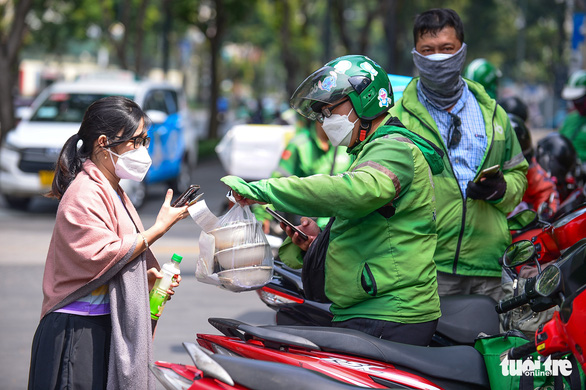The trend of online food purchasing, which has prevailed since the COVID-19 outbreak, and the prevalent use of plastic packaging in retail are increasing plastic waste volume, potentially causing long-term health risks.
During the strict COVID-19 restrictions last year, 75 percent of people living in Hanoi and Ho Chi Minh City used online food delivery services, according to a survey of Q&Me, a market research firm.
Such food is usually packed in boxes made of plastic that accounted for 64 percent of the total volume of materials used for the food packaging industry.
Many vendors prefer using plastic bags to contain various items sold online and at bricks-and-mortar shops.
ProCi Food, a Ho Chi Minh City-based non-profit social project, and some other eco-friendly businesses, like Phu Yen Province-based Tuy An Farm, have called on their customers to send back packaging to them so that they can return it to manufacturers for processing and reuse.
Some online grocery stores, such as ‘Sap Chang Sen’ in Hanoi, have also applied the same practice to minimize plastic waste.
Kafka Bookstores in Ho Chi Minh City and Stars Bookstore Company Limited in the capital have shared with their customers solutions for reducing waste from packaging and softening environmental impacts from their business operations.
Consumers can make online shopping ‘greener’ by including multiple items in one purchase order and by requesting sellers to use packing methods that help cut down on plastic packaging waste.
In developed countries, major e-commercial sites have made changes to packages to both facilitate buyers and lessen damage to the environment.
Amazon, for example, has turned to packets made from recyclable materials.
Manufacturers should work with retailers to have their goods shipped to online buyers in the original packaging, instead of using any additional one.
Suppliers and transporters should use linings made from eco-friendly materials instead of shock-absorbing films made of plastic.
Very little of the plastic people discard every day is recycled or incinerated in waste-to-energy facilities, but much of it ends up in landfills where it may take up to 1,000 years to decompose, leaking potentially toxic substances to soil and water, according to the United Nations Environment Program.
People eat, drink, and breathe micro-plastics every day, and these small plastic particles may be detrimental to human health once they have entered the body, according the Plastic Health Coalition (PHC), under the Netherlands-based Plastic Soup Foundation, a non-profit organization aiming to educate the public about plastic waste harm.
Plastic products contain chemical additives, some of which are associated with serious health problems such as hormone-related cancers, infertility, and neurodevelopment disorders like ADHD and autism, PHC said.
When plastics and micro-plastics end up in the environment, they attract micro-organisms, such as harmful bacteria, and if micro-plastics containing these pathogens penetrate the body, they may increase the risk of infection, the coalition warned.
Health experts emphasized that long-term usage and exposure of plastics and plastic products to high temperature can lead to leaking of toxic chemical constituents into food, drinks, and water.
Indiscriminate disposal of plastics on land and open-air burning can result in the release of harmful chemicals into the air, causing public health hazards, experts said.
Supermarkets and trade centers in Vietnam will be fined for distributing disposable plastic bags to customers from 2026, the Vietnam News Agency quoted an environment official as saying at a seminar held last month on reduction in the consumption of single-use plastic bags in Vietnam.
The official, Nguyen Trung Thang, deputy director of the Institute of Strategy and Policy on Natural Resources and Environment, under the Department of Industry and Trade of Hanoi, said that Vietnam had issued various legal documents to control serious risks of plastic waste to the environment.
The country also strives to use 100 percent of environmentally-friendly bags at shopping centers and supermarkets by 2025.
“From 2026, supermarkets and trade centers will be fined for providing disposable plastic bags for customers,” Thang said.
Like us on Facebook or follow us on Twitter to get the latest news about Vietnam!




















































